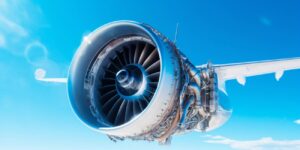Salaries for aircraft maintenance engineers can vary based on several factors such as experience, qualifications, and the specific sector within the aviation industry. On average, a freshly graduated aircraft maintenance engineer can expect a starting salary ranging from $50,000 to $60,000 per year.
As professionals gain experience and expertise in the field, their earning potential significantly increases. Mid-level aircraft maintenance engineers with a few years of experience can command salaries in the range of $70,000 to $90,000 annually.
However, the aviation industry recognizes the critical role of highly skilled and seasoned professionals. Aircraft maintenance engineers with extensive experience, advanced certifications, and a proven track record of excellence can potentially earn well into the six-figure range, surpassing $100,000 per year.
It’s important to note that the specific type of aircraft and the employer also influence salary levels. Those working with larger and more complex aircraft, such as commercial airlines or military aviation, generally command higher salaries compared to those in smaller, private aviation companies.
Let’s break down the salary expectations based on the aircraft maintenance engineer‘s experience:
| Experience Level | Average Annual Salary |
| Entry-Level | $50,000 – $60,000 |
| Mid-Level | $70,000 – $90,000 |
| Experienced | Over $100,000 |
Investing in continuous education, obtaining advanced certifications, and staying abreast of industry trends can be key factors in climbing the salary ladder in this dynamic field. As the aviation sector continues to evolve, the demand for skilled aircraft maintenance engineers remains robust, ensuring a promising career path with competitive remuneration.
Aircraft maintenance salary expectations tips and factors to consider
When considering a career in aircraft maintenance, it’s crucial to have a realistic expectation of the salary you can anticipate. Several factors come into play, influencing the compensation you might receive in this field.
First and foremost, experience plays a pivotal role in determining aircraft maintenance salaries. Those with a substantial history of working with different aircraft models and handling diverse maintenance tasks are likely to command a higher salary. Specialized skills in areas such as avionics or engine repair can also contribute to an elevated income.
Location is another significant factor influencing salary expectations. Salaries for aircraft maintenance technicians can vary widely depending on the geographic location. For instance, positions in major aviation hubs or cities with a high cost of living may offer higher salaries compared to positions in smaller towns or rural areas.
Industry certifications are crucial for career advancement and can positively impact your earning potential. Certifications from recognized aviation authorities, such as the Federal Aviation Administration (FAA) in the United States, not only enhance your skills but also make you more desirable to employers, leading to better salary prospects.
Considering the type of employer is essential when gauging salary expectations. Aircraft maintenance technicians working for major airlines might receive different compensation packages compared to those employed by smaller regional carriers, private companies, or government agencies. It’s advisable to research and understand the typical salary range offered by different types of employers in the aviation industry.
Education is a key determinant in aircraft maintenance salaries. Individuals with advanced degrees or additional training beyond the basic requirements may be eligible for higher-paying positions. Moreover, ongoing professional development and staying updated with the latest technologies and industry trends can contribute to a more competitive salary.
It’s important to recognize that the aviation industry operates on strict safety standards, and compliance with these standards is paramount. Therefore, individuals with a strong commitment to safety and a spotless record in terms of adherence to regulations may be eligible for bonuses or higher salaries as a result of their exemplary track record.
Aviation technician pay rate and job outlook
Aviation technicians play a pivotal role in ensuring the smooth operation of aircraft, with their responsibilities ranging from routine maintenance to intricate repairs. One of the critical aspects that job seekers often contemplate is the pay rate and job outlook in this dynamic field.
When it comes to pay rates, aviation technicians generally receive competitive compensation. The median annual wage for aviation maintenance technicians was $65,230 in the United States, as reported by the Bureau of Labor Statistics. This figure underscores the value placed on their expertise and the critical nature of their role in the aviation industry.
However, it’s essential to recognize that the pay rate can vary based on several factors. Experience, location, and the specific sector within the aviation industry can influence the compensation package. Technicians specializing in avionics or working for major airlines may command higher salaries compared to those in other niches.
As for the job outlook, the future appears promising for aviation technicians. The aviation industry is expected to witness sustained growth, leading to increased demand for skilled professionals. The Bureau of Labor Statistics anticipates a 5% growth in employment for aircraft and avionics equipment mechanics and technicians over the next decade, aligning with the average for all occupations.
Turning attention to the workload, aviation technicians often face a challenging yet rewarding daily routine. Their responsibilities include conducting regular inspections, troubleshooting issues, and performing scheduled maintenance tasks. The workload can be intense, especially during peak travel seasons or when addressing unexpected mechanical issues that demand swift resolution.
Several factors contribute to the demanding workload experienced by aviation technicians. The stringent safety regulations imposed by aviation authorities necessitate thorough checks and meticulous attention to detail. Additionally, the evolving technology in modern aircraft requires technicians to stay abreast of the latest advancements, further adding to their workload.
Entry level aircraft mechanic pay vs senior positions
An aircraft mechanic’s pay can significantly vary based on their experience and the level of position they hold within the industry. Entry-level positions typically offer lower pay compared to senior positions, reflecting the disparity in experience and qualifications.
Entry-level aircraft mechanics, often freshly graduated from technical schools or apprenticeships, usually start with a modest pay scale. The average entry-level pay for an aircraft mechanic hovers around $40,000 to $50,000 per year. This range can fluctuate based on the region, company, and specific qualifications of the individual. Typically, these positions require a fundamental understanding of aircraft systems, safety protocols, and basic troubleshooting skills.
| Criteria | Entry-Level | Senior Positions |
|---|---|---|
| Pay | $40,000 – $50,000 annually | $70,000 – $100,000+ annually |
| Experience | Minimal experience required | Extensive industry experience |
| Qualifications | Basic understanding | Advanced certifications, specializations |
On the contrary, senior positions demand a deeper understanding of aircraft systems, specialized knowledge in particular aircraft models or engines, and often require certifications from aviation regulatory bodies. This level of experience and qualifications commands a significantly higher pay scale. Senior aircraft mechanics with 10+ years of experience can earn anywhere from $70,000 to well over $100,000 annually.
The progression from entry-level to senior positions in the aircraft maintenance field is not solely based on years of service but also on a demonstrated mastery of skills, additional training, and potentially, higher qualifications. Experience coupled with specialized certifications or qualifications in advanced areas of aircraft maintenance, such as avionics or powerplant systems, can significantly impact an individual’s ability to secure senior positions with commensurate pay.






